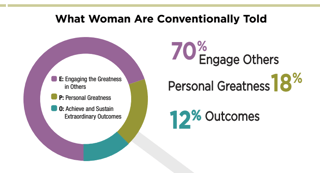
"Acquaintances... represent a source of social power, and the more acquaintances you have, the more powerful you are."
Malcolm Gladwell in The Tipping Point"Leaders who are good networkers... are the connectors...
They master what sociologist Mark Granovetter calls the 'weak tie',
a friendly yet casual social connection."
Robin Gerber in Leadership the Eleanor Roosevelt Way

If you read the above two quotes carefully, you will find a clue to one of the reasons that women are considered by male bosses as under-performing men in the area of having strategic networks and using them effectively. The male model for networking is acquaintances and "weak ties". The female model is...well, actually for many women in leadership it's not at all natural to think about networks, we think about friendships.
As a matter of fact, Gail Evans touches on this difference in her book, She Wins, You Win. She writes, "Forget networking. What we really need to be doing is what I call webbing... having a great evening with a friend whom you don't see again until the next time your paths cross is just as viable a relationship...such relationships must become the very fabric of our nexistence..." In other words, she's telling us that it's okay to have acquaintances and "weak ties" with other women for the purpose of business success, but we'll be more comfortable if we call it webbing, not networking!
Your 7 Tools
Whether you call it webbing or networking, many women in leadership positions have to reframe our inner game. If you're one, reframing your inner game is one of seven tools that can help you make your net work. Here are all 7:
-
Have a Goal: You can have all the acquaintances or friends in the world and take joy in these relationships, but you can't use them strategically if you don't have a goal. What do you want to win in life? What goal(s) do you hold clearly in your mind and close to your heart? When you can answer these questions, you're ready to think about strategic networking.
-
Reframe Your Inner Game: Reframing your inner game means changing any negative thoughts you have about strategic networking. If you think networking is bad, you won't be good at it. If you think it's about interactions in which there's the opportunity to give and to get, you'll have a chance of being good at it.
-
Mastering the Give - Think and then Link: When talking with someone who mentions a problem she's dealing with, an issue he's having, a goal or dream she desires; teach yourself to think, "Who do I know that can help with this?". Then, create the connection - right there, right then if possible.
-
Mastering the Give - Explicit Reciprocity: When you've gone out of your way to help someone in your network and you get thanked, don't say, "It was nothing" or any version of this. Instead, say something like, "I'm sure you'd do the same for me sometime." Set up the future opportunity for the other person to show gratitude to you by reciprocating in some way at some point in the future.
-
Mastering the Get - The Courageous Ask: The Courageous Ask is a straightforward request made from a position of strength and competence, not from a position of weakness and neediness. It's overt, direct and made without apology. It is easiest to say "yes" to a courageous ask if there is (or has been) a win for the other person. The win may be in the near term, in the past or possible in the future.
-
Mastering the Get - Nurture Your Network: Develop a system that works for you for keeping track of and keeping in touch with the people in your strategic network
If you're not a natural at strategic networking, these 7 tools and techniques will help you make your net work for you.







